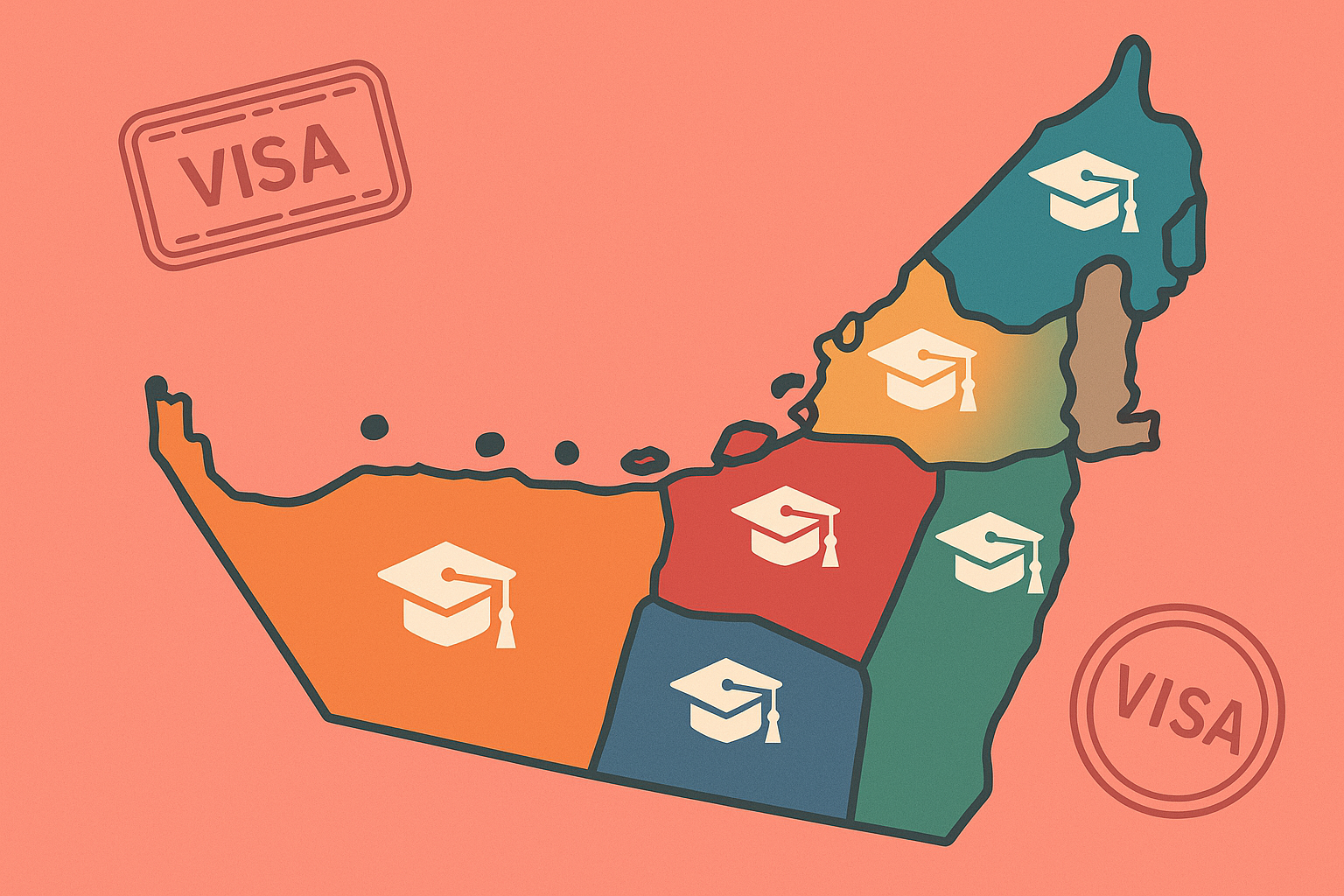I’ve been teaching in Dubai for six years now, and man, do I wish someone had sat me down and explained how this whole salary thing actually works before I signed my first contract. When people ask about teacher salary in Dubai, everyone throws around the same numbers – $2,500-$5,500 USD per month according to recent market data. But here’s the thing nobody tells you: that range is basically meaningless until you understand all the weird stuff that actually determines where you’ll land.
I’ve watched brilliant teachers struggle with terrible pay while others who aren’t half as good are living it up in fancy apartments. The difference? It’s not teaching ability – it’s knowing how to work a system that schools definitely don’t want you to figure out. Trust me, they’re not going to volunteer this information during your interview.
Table of Contents
-
The Paperwork Nightmare That Can Destroy Your Career
-
The Real Money Game (Hint: It’s Not Your Base Salary)
-
Why Your Visa Status Basically Controls Your Life
-
Timing Tricks That Can Boost Your Pay by Thousands
-
The Real Talk You Need to Hear
TL;DR
-
Lost your diploma? Your Dubai teaching career is basically over – schools need authenticated originals and won’t budge on this
-
Your housing allowance is 30-50% of your total pay, and choosing wrong can cost you $15,000 a year (yeah, really)
-
Got a master’s degree in underwater basket weaving? Doesn’t matter – you’ll still make 15-25% more than someone with just a bachelor’s
-
Dubai schools (KHDA) vs. Abu Dhabi schools (ADEK) are completely different worlds with different rules and pay scales
-
Apply during Ramadan or in August panic season and you might score 10-15% more money just because of timing
-
Your bonus depends more on keeping parents happy than actually being a good teacher (it’s as backwards as it sounds)
The Paperwork Nightmare That Can Destroy Your Career
Okay, so here’s where Dubai gets really fun – the teaching in dubai salary structure is basically built on a foundation of paperwork that would make the IRS jealous. I’m talking about a credential verification system that’s so brutal, I’ve seen amazing teachers get completely shut out because they couldn’t produce the right documents. Schools don’t care if you’re the next Robin Williams – if your paperwork isn’t perfect, you’re done.
This isn’t just bureaucratic nonsense (though it definitely is that too). This system literally determines how much money you can make, and most teachers have no idea how vulnerable they are until disaster strikes.
Your Degrees Matter Way More Than Your Teaching Skills
Here’s something that’ll blow your mind – Dubai’s salary bands are determined by your paperwork, not whether you can actually teach kids anything useful. Schools use these requirements to justify their crazy fees to parents, creating this weird arms race where your documentation matters more than whether you can manage a classroom without losing your sanity.
The average government teacher gross salary in Dubai is 140,027 AED (approximately $38,100 USD) according to SalaryExpert, but here’s the kicker – this baseline only applies if you can actually prove you’re qualified. No proper documents? You don’t even get to play the game.
The “Oh Crap, I Lost My Diploma” Disaster
Picture this nightmare scenario: you lose your original diplomas or transcripts, and suddenly you’re facing immediate salary cuts or complete job rejections. Dubai schools need authenticated originals for visa processing, and without them, you’re either stuck in the bargain basement salary tier or completely locked out.
The replacement process takes 6-12 weeks, and during that time, hiring windows close and opportunities vanish into thin air. My colleague Sarah learned this the expensive way when her house caught fire two weeks before starting her dream job at a premium Dubai school. Her UK teaching certificate went up in flames, and the replacement process through the Department for Education took 8 weeks. She had to take a position at a much lower-tier school for 25% less money while waiting. That timing mistake cost her nearly $8,000 that year alone.
Don’t Be Like Sarah – Document Security Checklist:
-
Make multiple certified copies of everything before you even think about moving here
-
Store originals with someone you trust back home
-
Research how long it takes your home country to replace documents (spoiler: it’s always longer than you think)
-
Keep digital scans in the cloud, just in case
-
Budget for emergency replacement costs because Murphy’s Law is real
The Apostille Timing Trap That Destroys Negotiations
Here’s a fun fact that nobody mentions until it’s too late – document authentication has a 6-month expiration date, and when it expires, you get to start the whole process over again. Poor timing can completely destroy your negotiating position, forcing you to accept whatever scraps they offer while you scramble to get your paperwork sorted.
The whole process costs $500-1500 and can drag on for months. I’ve watched teachers lose all their leverage because their documents expired right in the middle of negotiations. It’s honestly heartbreaking.
Steps you absolutely cannot skip:
-
Understand that 6-month validity window (it’s not negotiable)
-
Start document processing 3-4 months before you apply anywhere
-
Factor in UAE embassy processing times in your home country
-
Budget $500-1500 because this stuff isn’t cheap
The Qualification Arms Race That Makes No Sense
Dubai schools demand higher qualifications not because they make education better, but because they let schools charge parents more money. It’s this weird credential inflation where your master’s degree becomes a salary multiplier, regardless of whether it actually helps you teach better.
Why Your Master’s Degree Is a Golden Ticket (Even If It’s Useless)
Teachers with master’s degrees make 15-25% more money in Dubai, but here’s the plot twist – the subject barely matters. Schools care about the piece of paper, not whether your Master’s in Educational Leadership actually helps you teach third-grade math any better.
|
Qualification Level |
Average Monthly Salary (AED) |
Salary Premium |
Annual Difference |
|---|---|---|---|
|
Bachelor’s Degree |
12,000-15,000 |
Baseline |
– |
|
Master’s Degree |
15,000-18,750 |
25% |
AED 36,000-45,000 |
|
Teaching License |
13,500-16,875 |
12.5% |
AED 18,000-22,500 |
|
Master’s + License |
16,875-21,094 |
40.6% |
AED 58,500-73,125 |
Western Teaching Licenses = Instant Money Boost
Get this – a US state teaching license adds serious cash to your salary even when you’re teaching something completely different. I know a guy with a California elementary license who’s teaching high school chemistry and making bank. It’s all about the perceived prestige, not actual relevance.
The PhD Trap That Actually Backfires
Here’s where it gets weird – having a PhD can sometimes hurt you. You’re overqualified for classroom jobs but underqualified for admin roles. It’s like being stuck in qualification limbo, and your highest degree might actually limit your options. Yeah, it’s as backwards as it sounds.
The Real Money Game (Hint: It’s Not Your Base Salary)
Your base salary in Dubai? That’s just the appetizer. The real feast is in understanding all the housing allowances, performance bonuses, and benefit packages that can literally double what you actually take home. Most teachers obsess over the headline number and leave thousands on the table every year.
I totally made this mistake during my first contract negotiation, and it cost me big time. The teaching salary in dubai structure is deliberately confusing, and schools are counting on you not figuring out how to maximize these benefits.
The Housing Allowance Game That’ll Make or Break You
Housing allowances are 30-50% of your total pay package, but they’re set up in ways that can totally mess with your actual take-home money. The choices you make about furnished vs. unfurnished places, which neighborhood to live in, and when you get paid can swing your annual savings by $15,000 or more. No joke.
Top schools in Dubai typically pay between AED 16,000 to 17,000 per month plus up to AED 6,000 monthly for housing according to The National News, making housing benefits absolutely crucial to your financial survival here.
The $15,000 Furnished vs. Unfurnished Choice
Choosing between furnished housing money and unfurnished stipends isn’t just about convenience – it’s a massive financial decision that affects your long-term savings. Furnishing a Dubai apartment costs $8,000-20,000 upfront, but the monthly savings from unfurnished allowances can be huge if you’re staying more than a year.
My buddy Mark, who teaches high school math, chose an unfurnished housing allowance of AED 7,500 monthly over a furnished option worth AED 5,500. Yeah, he spent AED 45,000 ($12,250) on furniture upfront, but he saved AED 24,000 ($6,530) every year and sold his furniture for AED 25,000 when his contract ended. Over three years, he netted over $8,000 extra just from that one decision.
Housing Decision Reality Check:
-
Furnishing costs here are brutal (think $8,000-20,000)
-
Different neighborhoods have different rental markets
-
Some schools pay housing allowances upfront, others monthly
-
DEWA (utilities) might or might not be included
-
You can usually sell furniture when you leave, but not for what you paid
Family Housing Math That Doesn’t Make Sense
Family housing allowances don’t scale logically with family size. A family of four doesn’t get twice what a couple gets, which means timing your family planning around contract renewals can have serious financial implications. It’s weird, but that’s how it works here.
|
Family Status |
Typical Housing Allowance (AED) |
Additional Benefits |
Total Monthly Value |
|---|---|---|---|
|
Single Teacher |
4,500-6,000 |
None |
4,500-6,000 |
|
Married Couple |
6,000-8,000 |
Spouse visa support |
6,200-8,300 |
|
Family (1 child) |
7,000-9,500 |
Education allowance |
8,500-12,000 |
|
Family (2+ children) |
8,000-11,000 |
Multiple child discounts |
10,000-15,500 |
Performance Bonuses Based on Everything Except Teaching
Here’s the kicker about performance bonuses in Dubai schools – they have almost nothing to do with how well you actually teach. Student retention rates, parent satisfaction scores, and even whether you show up to school marketing events can determine your bonus. It’s like your relationship management skills matter more than your lesson plans.
Getting Paid for Keeping Kids Coming Back
Teachers get bonuses based on how many students return next year. So you might find yourself torn between maintaining academic standards and keeping parents happy enough to re-enroll their kids. It’s honestly pretty messed up when you think about it.
The Parent Happiness Premium That Rules Your Life
Your bonus depends on monthly parent communication and satisfaction scores. Your teaching skills? Secondary. Your ability to manage parent relationships and respond to their complaints? That’s where the money is, even when those complaints make no educational sense.
What Actually Gets You Paid (Parent Edition):
-
Weekly emails with specific achievement highlights
-
Monthly phone calls for updates
-
Quarterly face-to-face meetings
-
Responding to parent concerns within 24 hours (yes, really)
-
Sharing classroom photos and student work constantly
-
Being proactive about upcoming tests and projects
Why Your Visa Status Basically Controls Your Life
Your visa category in Dubai doesn’t just determine whether you can legally work here – it sets hard limits on how much you can earn, what benefits you can get, and whether you can actually change jobs. Most teachers don’t realize these restrictions exist until they try to move to a better school and discover they’re basically trapped by their visa type.
Recent news shows that “private schools committed to developing Emirati teachers despite public sector brain drain” according to The National News, which means even more competition for expat teaching positions and stricter visa requirements for international teachers.
The Sponsor Dependency That Caps Your Money
Teachers sponsored by different types of schools face completely different salary rules and mobility restrictions. Government schools, private schools, and education companies all play by different rules, and switching between them can require expensive visa changes that eat into your earnings for months.
KHDA vs. ADEK: The Geographic Lottery
Teaching in Dubai (KHDA jurisdiction) versus Abu Dhabi (ADEK jurisdiction) is like playing in two completely different leagues with different salary rules, benefit requirements, and career options. This geographic lottery can impact your earning potential by thousands annually, and most teachers don’t even know which system they’re in.
My friend Jennifer, a Canadian math teacher, found out the hard way that moving from a KHDA school in Dubai to an ADEK school in Abu Dhabi meant re-authenticating all her documents, changing her visa sponsorship, and waiting 6 weeks without income during the transfer. The move cost her AED 12,000 in fees and lost wages, even though the new job paid 20% more.
Before You Make Any Moves, Research This Stuff:
-
Figure out which education authority governs your target school
-
Understand visa transfer restrictions between jurisdictions
-
Try to stay within the same emirate if possible
-
Budget $2,000-4,000 for visa change costs
-
Check continuing education requirements for each authority
-
Make sure your teaching license works across jurisdictions
Free Zone Jobs: The Hidden Goldmine
Teachers employed by companies in Dubai’s free zones get different tax implications and salary structures that can seriously boost your take-home pay. These jobs are rare in education, but when they pop up, they can provide major financial advantages that most teachers never even hear about.
The Dependent Visa Money Drain
Dependent visa costs create hidden impacts that can reduce your actual income by 10-20% every year. The expenses go way beyond visa fees – we’re talking education costs, healthcare requirements, and mobility restrictions that add up over time.
According to Irish Examiner, school fees in the UAE can cost up to €16,500 per year per child, and parents have crazy high expectations, making dependent education costs a huge factor in family budgets.
Education Fees That Destroy Your Savings
Your kids’ education costs range from $5,000-25,000 per child every year, and employers rarely cover it all . These hidden costs can completely wipe out the financial benefits of teaching in Dubai, especially if you have multiple kids.
Family Education Budget Reality Check:
-
Negotiate education allowances as separate contract items
-
Research school payment schedules for cash flow planning
-
Look into sibling discounts at international schools
-
Factor in extras like uniforms, transport, and activities
-
Expect annual fee increases (usually 3-5%)
-
Think about curriculum alignment with your home country
Timing Tricks That Can Boost Your Pay by Thousands
Dubai’s teacher salary negotiations work on unique cultural and timing patterns that create massive pay differences for the exact same jobs. Understanding these patterns can get you 20-40% higher packages, while bad timing can lock you into below-market rates for years.
The Ramadan Sweet Spot Nobody Talks About
Hiring decisions during Ramadan often result in better salary packages because there’s less competition and cultural generosity traditions work in your favor. Schools have fewer candidates to pick from, and the whole cultural vibe around giving during this period can actually boost your negotiations.
I stumbled onto this by accident during my second year here. The school had been trying to fill a math position for weeks with no luck. My timing hit the final weeks of Ramadan, and I ended up with a package 18% higher than what they originally posted. Sometimes luck beats strategy.
Eid Bonus Timing That Actually Pays
Schools often throw in better signing bonuses or improved packages during Eid periods to attract quality candidates when competition is basically nonexistent. The cultural emphasis on generosity during these times can translate into real money for smart job seekers.
Strategic Application Timeline (Trust Me on This):
-
Target late Ramadan/early Shawwal for applications
-
Research cultural giving traditions that influence negotiations
-
Be ready for weird interview scheduling during fasting hours
-
Expect slower decision-making during religious periods
-
Use cultural timing for contract renewals too
-
Plan your submissions for maximum cultural impact
The August Panic Premium
Schools facing last-minute teacher departures in summer often throw money at the problem to secure qualified candidates quickly. The closer you get to the school year start, the more desperate they become, and desperation equals higher salary offers.
The teacher shortage is real – just look at job postings like the “Teacher of Mathematics Senior School KS3-4” position at Durham School Dubai on TES, which opened in August 2022 and keeps expanding, showing the ongoing demand for qualified teachers.
The 15% Panic Premium for Starting Tomorrow
Teachers who can start immediately in August can demand 10-15% salary premiums because schools are literally panicking about unfilled positions. Your flexibility becomes valuable currency that schools will pay extra for, especially when they’re facing the nightmare of starting the year short-staffed.
Last-Minute Hiring Advantage Playbook:
-
Keep your credentials updated and applications ready to go
-
Network with recruitment agencies for urgent placements
-
Be ready for super fast interview processes
-
Negotiate signing bonuses for immediate availability
-
Use urgency to improve housing and benefits
-
Make your flexibility a key selling point
Peak Hiring Seasons Reality:
-
March-May: Main hiring season, standard rates
-
June-July: More competition, moderate premiums
-
August: Desperation mode, 10-15% salary premiums
-
September-October: Limited openings, replacement jobs
-
Ramadan Period: Less competition, cultural generosity benefits
-
Eid Seasons: Better packages and signing bonuses
The Real Talk You Need to Hear
Look, teaching in Dubai can be incredibly lucrative, but only if you understand the weird systems that actually determine your pay. Schools aren’t going to tell you about this stuff because they benefit when teachers don’t know how to work the system effectively.
Your credentials are everything in Dubai’s education market, and losing them can literally end your career here. The difference between teachers who struggle financially and those who thrive often comes down to having the right information. Now you have it.
Here’s what I wish someone had told me six years ago: use this knowledge strategically, negotiate like your financial future depends on it (because it does), and remember that your success depends as much on understanding these hidden systems as it does on whether you can actually teach kids.
I’ve watched too many talented teachers leave Dubai frustrated and broke simply because they didn’t know these insider secrets existed. The schools definitely aren’t going to share this information – they make more money when teachers accept below-market packages.
But now you’re armed with the real deal. You can turn the tables and get the compensation you actually deserve instead of whatever scraps they initially offer.
The system is weird, sometimes unfair, and definitely more complicated than it should be. But once you crack the code, you can do really well here. Six years later, I’m glad I figured this stuff out the hard way so you don’t have to.









